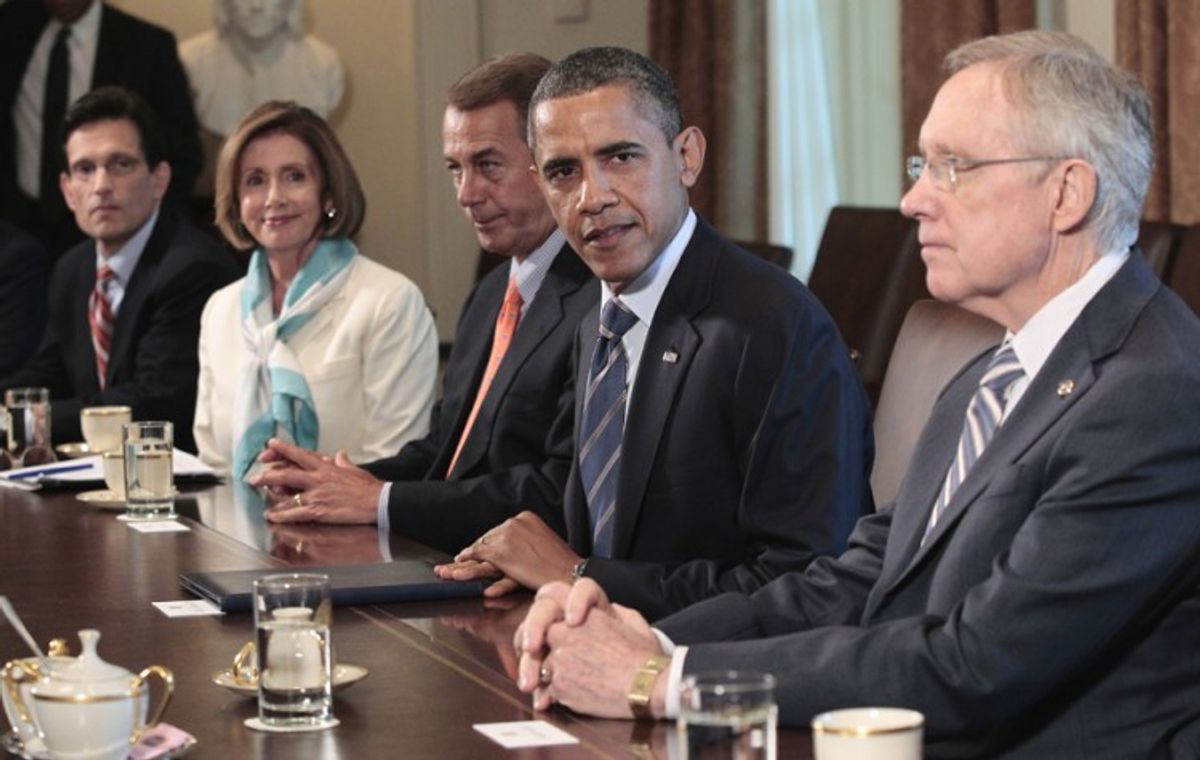It's fair to say that the House GOP's "strategy" in merging the government shutdown and debt limit fights is to deploy one gimmick after another in the hope that one of them effectively changes the game.
Today's is no different, but it could point the way to a mutually agreeable stand down if House Republicans agree to a simple swap.
The latest ploy is to create a statutory "working group" of 10 House (six Republican, four Democratic) members and 10 senators (six Democratic, four Republican) to discuss funding the government, increasing the debt limit, and cuts to direct spending programs (Social Security, Medicare and so on). Tax revenue would be outside this group's jurisdiction, which is one potential deal breaker. There's no enforcement mechanism to compel the group to cut a deal, and it says nothing about what happens right now, with an ongoing shutdown and a debt limit breach fast approaching.
On its own, this is a non-starter. As Senate Budget Committee Chairwoman Patty Murray, D-Wash., noted, "This Republican gimmick is intended to keep two crises going while they again refuse to make any concessions."
Republicans could change that by agreeing to add revenue to the group's jurisdiction. But as it is, it's a ruse to get Democrats to implicitly endorse a cuts-only budget framework. Combine this with a separate GOP idea to advance a short-term debt limit increase, and suddenly Democrats will be locked into the extortion dynamic they've been resisting.
But here's the trade that might make this work.
Over in the Senate, Democrats (along with Republicans) have passed a bill to fund the entire government for five weeks and are about to move legislation to increase the debt limit for a year.
The swap I'm proposing is this: The Senate accepts the working group plan if the House accepts the temporary funding bill and a year-long debt limit increase. That removes the threat of default for a considerable time, and reopens the government long enough for the two parties to have the negotiation Republicans now claim to want. If taxes aren't part of the discussions, fine. That just assures they won't go very far. The working group plan stipulates that members "shall meet on each calendar day thereafter unless both co-chairs jointly determine that there is good cause to dispense with such meeting." After five weeks, if Democrats won't submit to a cuts-only approach, and Republicans won't agree to new revenues, the group can disband, and the only threat would be another government shutdown. One that could be averted by a narrow appropriations agreement, subject to sequestration.
There's an added fig leaf here for John Boehner, too, in that if the Senate clears the House plan first, these working group talks can begin before the House increases the debt limit. He can claim he forced Democrats to the table. But of course, Republicans aren't interested in "negotiations" as the term is commonly understood. Boehner doesn't even have a position to negotiate for. He wants Democrats to sit down and identify some stuff they'd be willing to give him to avoid an immediate breach. The Beutler plan eliminates that outcome, which is why I don't hold out much hope for it -- at least not this week. Maybe when the deadline's a few days closer.

Shares